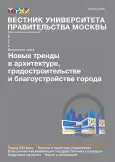Ecology and architecture: synthesis and the main development trends
- Авторлар: Titov E.V.1, Dmitrieva O.V.1
-
Мекемелер:
- Moscow Metropolitan Governance Yury Luzhkov University
- Шығарылым: № 1 (51) (2021)
- Беттер: 57-60
- Бөлім: Наука и инновации
- URL: https://journal-vniispk.ru/2541-8580/article/view/295912
- ID: 295912
Дәйексөз келтіру
Аннотация
Since time immemorial there existed a bond between architecture and ecology that arose from the dependence of human kind from the natural environment conditions. The “Man – Nature” relationship has always had a strong impact on the art. Since ancient times the ecological tradition has developed in architecture, reflecting the strive of a man to achieve the harmony with nature. In their works, architects repeated natural forms for the sake of visual beauty. Turning to nature favors pragmatic interests as well – an urban environment with natural elements included is more comfortable for the citizens. The process of greening architecture based on aesthetic and pragmatic approaches currently finds its evocation in novel ecologically sustainable structures. Buildings of this kind exert minimal impact on the environment and make it possible to provide citizens with comfortable living conditions.
Негізгі сөздер
Авторлар туралы
E. Titov
Moscow Metropolitan Governance Yury Luzhkov University
Хат алмасуға жауапты Автор.
Email: info@mguu.ru
Professor with the Chair of City Economy and Housing Law, Doctor of Pedagogy, Associate Professor
Ресей, MoscowO. Dmitrieva
Moscow Metropolitan Governance Yury Luzhkov University
Email: info@mguu.ru
Associate professor with the Chair of City Economy and Housing Law, PhD in agricultural sciences
Ресей, MoscowӘдебиет тізімі
- Babkina D. O., Yanova R. Yu., Popova A. V., Sorokoumova T. V. World Standards of “Green architecture”, Prospects of Their Adaptation and Use Under Russian Conditions. The urbanized territories’ ecology, 2019, no. 1, pp. 70-74. (In Russ.).
- Vityuk E. Y., Umorina Z. E. Natural Technologies as a New Principle of Conformation in Architecture. Vestnik Tomskogo gosudarstvennogo arkhitekturno-stroitel’nogo universiteta. JOURNAL of Construction and Architecture, 2018, no. 4, pp. 55-64. (In Russ.).
- Donchuk T. V., Polyakov E. N. Bionic Aspects in Creativity of Anthony Gaudi. Vestnik Tomskogo gosudarstvennogo arkhitekturno-stroitel’nogo universiteta. JOURNAL of Construction and Architecture, 2018, no. 2, pp. 9-30. (In Russ.).
- Ilvitskaya S. V., Lobkov V. A., Lobkova T. V. Natural Materials in “Green” Architecture. Academia. Architecture and Construction, 2019, no. 2, pp. 130-133. (In Russ.).
- Pavlova V. A., Kashytsyna A. A. Green Technologies and Natural Elements Inside Structures. Architecture and Modern Information Technologies, 2019, no. 3 (48), pp. 200-216. (In Russ.).
- Pryadko I. P. Green Architecture as a Factor of Ecological Security in Urbanized Territories: Russia’s and World’s Best Practices. Urbanistics, 2018, no. 2. pp. 87-97. (In Russ.).
- Umorina Z. E. Technological Details of Bionic Architecture. Bulletin of BSTU named after V.G. Shukhov, 2019, no. 3, pp. 69-77. (In Russ.).
- Fomenko N. A. Nature as the Basis of Architecture. Technical Sciences – from Theory on to Practice, 2013, no. 29, pp. 144-148. (In Russ.).
Қосымша файлдар









